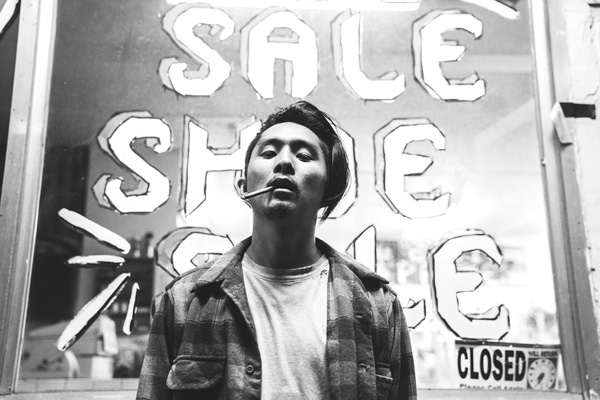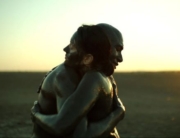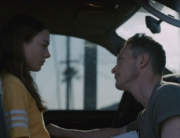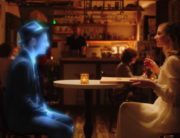Justin Chon’s debut feature opens with a scene of racially charged violence: a Korean American named Eli (Chon) is unloading shoes from the back of a truck when a Latino gang jumps him. Framed in slow motion, the beating is brutal and accompanied by racist taunts. But once it’s over and the gang has left, a bloodied Eli simply picks himself up, dusts himself off, and drives away with a lit cigarette in his mouth. What we’ve just witnessed is horrific, but the impression we get is that for him, it’s just another day in Paramount, a neighborhood adjacent to South Central Los Angeles.
That initial scene sets the tone for much of what follows for Eli and his brother, Daniel (David So), who run a struggling shoe store during the early 1990s. (The use of black-and-white cinematography lends Gook a timeless quality.) There’s tension between the Koreans, who are a minority in the neighborhood, and the African Americans and Latinos who make up the majority. For the most part, it appears in the form of distrust—at one point, when Daniel rings up a sale and includes the sales tax, the customer responds with, “You people are always trying to rip us off.” Meanwhile, the brothers’ own relationship is not the best, with Eli constantly criticizing Daniel for his indifferent attitude.
The only ray of sunshine is Kamilla (Simone Baker), an 11-year-old African American girl who regularly visits the store. Kamilla doesn’t have much of a family life: her sister, Regina (Omono Okojie), and brother, Keith (a volcanic Curtiss Cook Jr.), seem too overburdened or distracted to pay her much notice. She’s content with whatever attention she receives from Eli and Daniel, and while they tell her not to come around at first, her persistence wears them down.
From her very first appearance, in which she’s dancing in front of a raging inferno, Kamilla comes across as a wild card in an otherwise predictable environment of racial animosity. When she’s at the store, Chon occasionally switches to fantasy sequences from her point of view, which are amusing as they contrast sharply from reality. She represents the hope of two different communities getting along, and one of the film’s most heartwarming scenes involves her and Eli going to a car wash to try and erase racist graffiti from the latter’s vehicle. (Notably, the spray-painted epithet “gook” does not wash off.)
The criminal trial of the LAPD officers who nearly beat Rodney King to death looms large throughout, and the main characters sense trouble approaching. Unfortunately, on the same day as the acquittal verdict, which in real-life ignited the 1992 riots that left South Central devastated, Eli finds himself marooned at the store, while Daniel is coerced into venturing into the areas where mass looting is taking place.
The film is an at times unflinching look at racial disharmony—and one centered entirely on non-white protagonists for a change. Yet Chon, who also wrote the screenplay, avoids depicting anybody as a one-dimensional monster (the exception being a few hoodlums with extremely limited screen time). That includes Mr. Kim (Sang Chon), who runs a liquor store located near the brothers and at one point pulls a gun on Kamilla during a heated exchange. (The scene seems inspired by a real-life incident in which Latasha Harlin, a young black teenager, was shot to death by a Korean shopkeeper.) Despite such an outrageous and cowardly act, he eventually gets a chance to explain himself, which doesn’t excuse what he did, but allows him to come across as slightly more sympathetic.
There is similar depth given to Keith, the closest role to a primary antagonist, but even in his case, what informs his anger is more than just irrational fears of the other. As it turns out, a connection existed between his family’s mother and Eli and Daniel’s father. Once all the secrets are laid bare, the revelations recast Keith’s ill will in a new light. Unfortunately, he lets his passions overwhelm him to tragic effect.
Right up to its 11th hour, the film offers hope that we can all transcend our worse impulses before delivering an absolute gut punch of an ending, yet one that rings true, given the racially divisive times in which we currently live. Anyone paying attention to the news knows we still have much work to do before we can all truly get along, and that makes Gook essential viewing.







Leave A Comment